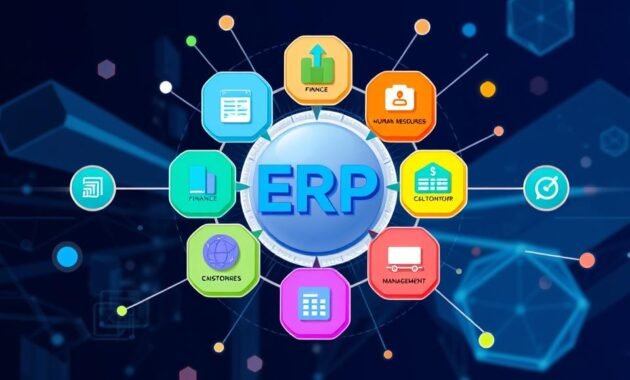In today’s fast-paced business landscape, organizations are constantly seeking ways to streamline their operations and drive efficiency. One innovative solution that has emerged as a game-changer is the enterprise resource planning (ERP) system. These comprehensive software platforms integrate and automate a wide range of business processes, from accounting and human resources to supply chain management and customer relationship management.
At the core of an ERP system is the ability to consolidate data from various departments and functions into a centralized, easy-to-access platform. This integration allows organizations to gain a holistic view of their operations, enabling more informed decision-making and improved overall performance. By streamlining workflows and eliminating siloed data, ERP systems empower businesses to enhance productivity, reduce costs, and ultimately, boost their bottom line.
Key Takeaways
- Enterprise resource planning (ERP) systems integrate and automate core business functions, providing a centralized platform for managing an organization.
- ERP systems consolidate data from various departments, enabling businesses to gain a comprehensive view of their operations and make more informed decisions.
- By streamlining workflows and eliminating data silos, ERP systems help organizations enhance efficiency, reduce costs, and drive overall growth and profitability.
- The adoption of ERP software has become a critical strategy for businesses seeking to gain a competitive edge in the modern, data-driven business landscape.
- Implementing an ERP system can lead to significant improvements in productivity, decision-making, and financial performance for organizations of all sizes and industries.
Streamlining Business Operations with Enterprise Resource Planning Systems
In today’s fast-paced business landscape, organizations are constantly seeking ways to optimize their operations and drive efficiency. One powerful tool that has emerged to help achieve this goal is the enterprise resource planning (ERP) system. These comprehensive software solutions are designed to seamlessly integrate and manage a company’s entire business operations, from finance and accounting to human resources and supply chain management.
What is an Enterprise Resource Planning (ERP) System?
An ERP system is a suite of interconnected modules that work together to provide a holistic view of an organization. These systems typically include key components such as financial management, human capital management, business process automation, resource optimization tools, and supply chain management. By consolidating all of these essential functions into a single, centralized platform, ERP systems enable businesses to streamline their workflows, enhance data visibility, and make more informed decisions.
Key Components of ERP Software
The core components of an ERP system often include:
- Financial Management: Accounting, payroll, and financial reporting
- Human Capital Management: Human resources, talent management, and employee tracking
- Supply Chain Management: Inventory control, logistics, and procurement
- Customer Relationship Management (CRM): Sales, marketing, and customer service
- Business Intelligence: Data analytics, reporting, and decision-making tools
By integrating these essential business functions, ERP systems provide a centralized platform that enables organizations to streamline their operations, enhance productivity, and make more informed decisions.

Enterprise Resource Planning Systems: Driving Efficiency and Productivity
Implementing enterprise software suites like data integration platforms can unlock significant operational efficiencies and productivity gains for businesses. By integrating real-time data across various departments, ERP systems eliminate data silos and foster cross-functional collaboration. This integration streamlines processes, reduces manual data entry, and provides better visibility into the company’s overall performance.
Moreover, modern ERP solutions often include powerful analytics and reporting tools that empower organizations to make data-driven decisions, optimize resource utilization, and identify areas for improvement. The seamless flow of information enabled by these operational efficiency solutions helps businesses stay agile and responsive to changing market demands.
| Key Benefits of ERP Systems | Impact on Business Operations |
|---|---|
|
|
By leveraging the power of enterprise software suites and data integration platforms, businesses can streamline their operations, enhance productivity, and stay ahead of the competition in today’s dynamic market landscape.
Conclusion
Enterprise resource planning (ERP) systems have become an indispensable tool for businesses seeking to streamline operations, enhance efficiency, and drive growth. By integrating core business functions into a centralized platform, ERP solutions provide organizations with a comprehensive view of their operations, enabling better decision-making, improved resource optimization, and increased productivity.
As companies navigate an increasingly competitive landscape, the adoption of ERP software will remain a key strategy for achieving operational excellence and sustaining long-term success. These business management solutions empower organizations to align their processes, optimize resources, and gain valuable insights, empowering them to make informed decisions and stay ahead of the curve.
Moving forward, the continued evolution and integration of ERP systems with emerging technologies, such as cloud computing, artificial intelligence, and the Internet of Things, will further enhance the capabilities of these enterprise-wide platforms. Businesses that invest in robust ERP systems will be well-positioned to adapt to changing market conditions, enhance customer experiences, and maintain a competitive edge in their respective industries.

